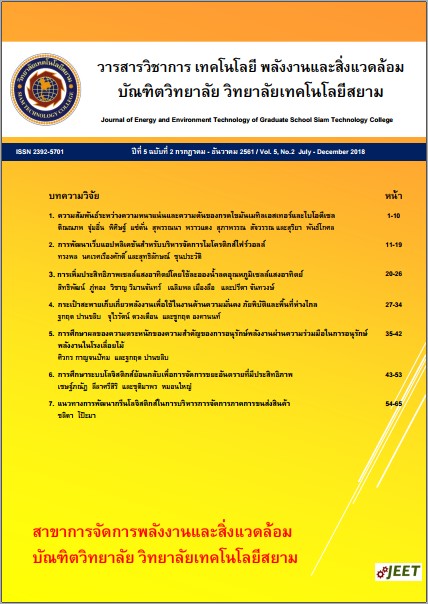Improvement of Photovoltaic Cell Efficiency by Using Water Mist to Reduce Photovoltaic Cell Temperature
Main Article Content
Abstract
Temperature factor significantly affected on the electrical production of photovoltaic (PV) cell. Every one degree Celsius (oC) temperature rise corresponds to a drop in efficiency by 0.5%. The aim of this project is to reduce the operating temperature by using water mist to increase the efficiency of PV cell. The study setup consisted of two 50 Watt Monocrystalline PV cell, tilt of 15 degree with reference to the horizontal. One is the control, another is the experiment that equipped with sprayer to spray water mist directly to the back surface of PV cell. The experiments were performed at the same time, same place. Electrical current, voltage, solar radiation, ambient temperature, relative humidity and both surfaces temperature of PV cell were recorded and compared.The results show that using water mist spray can reduce temperature 19.9 oC on front surface and 24.9 oC on back surface of PV cell. As a consequence, the electrical efficiency is increased by 13.788 % at the peak solar radiation condition (Solar intensity >1000 W/m2). Water consumption rate is only 11.914 L/h.
Article Details
เนื้อหาและข่อมูลในบทความที่ลงตีพิมพ์ในวารสารวิชาการ เทคโนโลยี พลังงาน และสิ่งแวดล้อม บัณฑิตวิทยาลัย วิทยาลัยเทคโนโลยีสยาม ถือเป็นข้อคิดเห็นและความรับผิดชอบของผู้เขียนบทความโดยตรง ซึ่งกองบรรณาธิการวารสารไม่จำเป็นต้องเห็นด้วย หรือว่าร่วมรับผิดชอบใด ๆ
บทความ ข้อมูล เนื้อหา รูปภาพ ฯลฯ ที่ได้รับการตีพิมพ์ในวารสารวิชาการ เทคโนโลยี พลังงาน และสิ่งแวดล้อม บัณฑิตวิทยาลัย วิทยาลัยเทคโนโลยีสยาม ถือเป็นลิขสิทธิ์ของวารสารวิชาการ เทคโนโลยี พลังงาน และสิ่งแวดล้อม บัณฑิตวิทยาลัย วิทยาลัยเทคโนโลยีสยาม หากบุคคล หรือหน่วยงานใดต้องการนำทั้งหมด หรือส่วนหนึ่งส่วนใดไปเผยแพร่ต่อ หรือเพื่อกระทำการใด ๆ จะต้องได้รับอนุญาต เป็นลายลักษณ์อักษรจากวารสารวิชาการ เทคโนโลยี พลังงาน และสิ่งแวดล้อม บัณฑิตวิทยาลัย วิทยาลัยเทคโนโลยีสยาม เท่านั้น
References
[2] Hasanuzzaman M, Malek ABMA, Islam MM, Pandey AK, Rahim NA. Global advancement of cooling technologies for PV systems: A review. Solar Energy. 2016; 137:25-45.
[3] Saad Odeh MB. Improving photovoltaic module efficiency using water cooling. Heat Transfer Engineering. 2009;30(6):499-505.
[4] Moharram KA, Abd-Elhady MS, Kandil HA, El-Sherif H. Enhancing the performance of photovoltaic panels by water cooling. Ain Shams Engineering Journal. 2013;4(4):869-77.
[5] Nižetić S, Čoko D, Yadav A, Grubišić-Čabo F. Water spray cooling technique applied on a photovoltaic panel: The performance response. Energy Conversion and Management. 2016; 108: 287-96.


